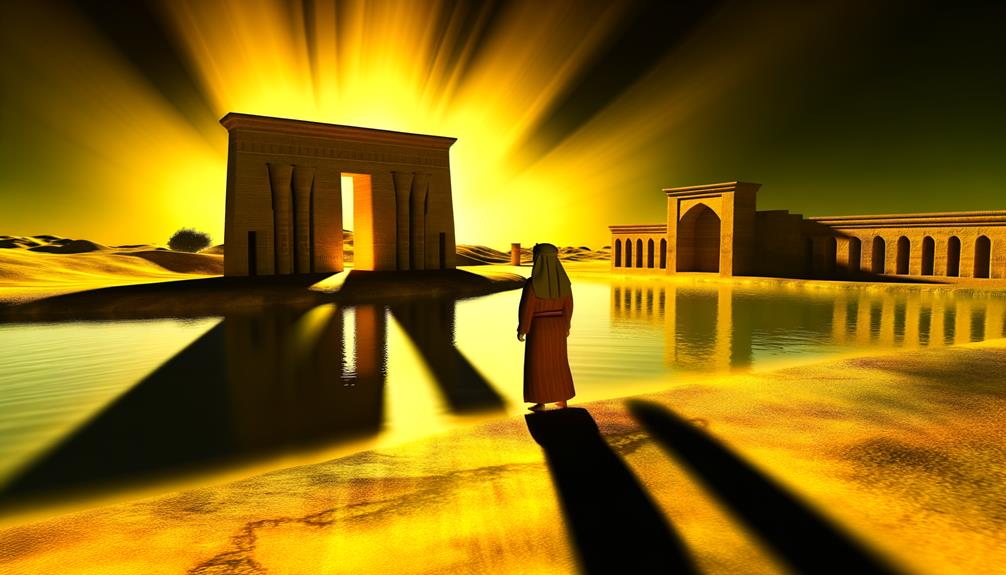Meaning of the Name Meshach
The name Meshach originates from the Hebrew Bible and finds its roots in the ancient Babylonian exile. It translates to "Who is what God is?" and serves as a Babylonian adaptation of the Hebrew name Mishael.
Historically, it symbolizes cultural assimilation and the resilience of faith amidst adversity. Meshach also signifies divine deliverance and unwavering belief, resonating deeply in Judeo-Christian traditions.
While its use in contemporary baby naming is limited, it remains a powerful cultural and symbolic reference, particularly in religious and literary contexts. To explore the broader implications and rich significance of this name, additional study is essential.

Key Takeaways
- Meshach is the Babylonian counterpart to the Hebrew name Mishael.
- It means 'Who is what God is?' in its Hebrew context.
- The name symbolizes unwavering faith and divine deliverance.
- Meshach represents cultural assimilation and identity transformation during the Babylonian exile.
- It holds cultural and religious significance in ancient Babylonian and Judeo-Christian traditions.
Origin of Meshach
The name Meshach, of significant historical and religious import, originates from the Hebrew Bible and is associated with the Babylonian exile period. This nomenclature is the Babylonian counterpart to the Hebrew name Mishael, reflecting the cultural assimilation and identity transformation experienced by the Hebrew exiles.
Linguistically, 'Meshach' can be traced to ancient Akkadian roots, embodying a blend of Semitic linguistic influences. The adaptation of Hebrew names into Babylonian forms underscores the broader socio-political dynamics and intercultural exchanges of the era.
This convergence of linguistic traditions highlights the complexity of identity and cultural preservation amidst foreign domination. Understanding the origin of Meshach, therefore, provides insight into the profound historical narratives and linguistic evolution within the context of ancient Near Eastern societies.
Biblical References
Prominently, the name Meshach features within the biblical canon in the Book of Daniel as one of the three Hebrew youths, alongside Shadrach and Abednego, who were exiled to Babylon. Their story is emblematic of unwavering faith and divine deliverance. They famously refused to bow to King Nebuchadnezzar's golden image and were subsequently cast into a fiery furnace. Miraculously, they emerged unscathed, symbolizing God's protection and the triumph of steadfast belief.
Meshach's narrative serves as a profound reflection of the virtues of courage, faithfulness, and the power of divine intervention in the face of persecution.
Etymology of Meshach
In exploring the etymology of Meshach, understanding the linguistic and cultural origins of the name provides deeper insights into its significance within the biblical narrative.
The name Meshach is derived from the Babylonian name Mishael, which is of Hebrew origin, meaning 'Who is what God is?' This derivation indicates a profound connection to the character's identity and faith.
In the Book of Daniel, the name Meshach is given to Mishael as part of a Babylonian assimilation strategy, reflecting both a linguistic adaptation and a cultural imposition.
The transformation from Mishael to Meshach encapsulates the tension between Hebrew and Babylonian cultures, highlighting the broader themes of identity and resistance within the biblical text.
Cultural Significance
The name Meshach holds significant cultural weight, mainly rooted in its historical context and origins within the Babylonian exile narrative in the Hebrew Bible.
Modern interpretations and usage of the name reflect a dynamic interplay between its ancient associations and contemporary cultural adaptations.
Analyzing these dimensions provides an in-depth understanding of Meshach's enduring relevance across historical and modern contexts.
Historical Context and Origins
Rooted in ancient Near Eastern traditions, the name Meshach holds significant cultural and religious connotations that are deeply intertwined with the historical narrative of the Hebrew Bible.
Originating in the Babylonian Exile period (circa 6th century BCE), Meshach is one of the three companions of Daniel, known for their unwavering faith in the face of persecution. The name itself is believed to be a Babylonian form of the Hebrew name Mishael, which means 'Who is what God is?' This transformation underscores the cultural assimilation and identity struggles faced by the Jewish people during their captivity.
The historical context of Meshach thus reflects broader themes of resilience and faith amid adversity, emblematic of the Jewish experience in exile.
Modern Interpretations and Usage
Reflecting on its ancient origins, the name Meshach continues to hold considerable cultural and religious significance in contemporary contexts, symbolizing steadfast faith and resilience. Modern interpretations often draw from its Biblical narrative, emphasizing themes of survival against oppression and unwavering commitment to one's beliefs. The name is celebrated in various communities and often used to inspire virtues in educational and religious settings.
| Context | Significance |
|---|---|
| Religious Ceremonies | Symbol of Faith |
| Educational Institutions | Model of Resilience |
| Literary References | Archetype of Integrity |
| Cultural Events | Representation of Heritage |
| Personal Naming | Embodiment of Strength |
Continuing to resonate deeply, Meshach stands as an enduring proof to resilience and moral fortitude across cultures.
Historical Context
Historically, the name Meshach holds significant importance within the context of ancient Babylonian culture and Judeo-Christian traditions. Meshach, originally named Mishael, was one of the Hebrew youths selected for royal service in Babylon as recorded in the Book of Daniel.
The name Meshach is believed to be a Babylonian alteration of Mishael, symbolizing the imposition of Babylonian culture upon Hebrew captives. This renaming reflects the broader historical practice of assimilating conquered peoples by changing their identities.
In Judeo-Christian traditions, Meshach's story is emblematic of faith and resilience, particularly in the narrative where he, along with Shadrach and Abednego, survives the fiery furnace. This historical backdrop provides a rich tapestry for understanding the name's enduring legacy and profound cultural resonance.
Meshach in Literature
Throughout various literary works, the character of Meshach has been employed as a powerful symbol of unwavering faith and resilience against oppression. Originating from the biblical account in the Book of Daniel, where Meshach, along with Shadrach and Abednego, defies King Nebuchadnezzar's decree to worship a golden idol, this figure has transcended its scriptural boundaries.
Literary interpretations often focus on Meshach's moral fortitude and steadfastness in the face of existential threats. Authors use Meshach to explore themes of individual conviction versus authoritarian mandates, as well as the broader struggle for spiritual and personal freedom.
Such portrayals not only reinforce the historical and religious significance of Meshach but also invite readers to reflect on the perennial human quest for integrity and justice.
Modern Usage
In contemporary contexts, the name Meshach has experienced varying degrees of popularity in baby naming trends, particularly within specific cultural and religious communities.
Current cultural references and media portrayals also contribute to the name's resonance in modern society.
Additionally, the name has seen various adaptations and variations, reflecting its integration into different linguistic and cultural frameworks.
Popularity in Baby Names
The name Meshach, though rooted in ancient biblical traditions, has seen limited adoption in contemporary baby naming practices. This rarity can be attributed to its strong association with the biblical narrative of the Book of Daniel, where Meshach is one of the three Hebrew men thrown into the fiery furnace.
Modern parents often gravitate towards names that either have a more versatile cultural resonance or a softer phonetic appeal. Additionally, Meshach's somewhat archaic and less familiar sound may deter its mainstream acceptance.
Analysis of baby name databases reveals that Meshach seldom appears in top name lists, indicating its niche status. Consequently, while rich in historical and religious significance, Meshach remains an uncommon choice in today's naming conventions.
Cultural References Today
Despite its rarity in contemporary baby naming practices, the name Meshach continues to hold cultural significance through various modern references in literature, media, and religious contexts. These references serve to immortalize the name, embedding it within the cultural memory and ensuring its continual relevance.
| Medium | Example |
|---|---|
| Literature | "The Handmaid's Tale" by Margaret Atwood |
| Television | "Supernatural" series |
| Music | "Shadrach, Meshach, Abednego" by Louis Armstrong |
| Religious Texts | Modern Bible translations and interpretations |
Analyzing these references, one observes that the name Meshach is often used symbolically to evoke themes of resilience, faith, and moral integrity. This enduring cultural presence underscores the name's rich historical and narrative significance.
Name Variations and Adaptations
Exploring the various adaptations and modern usage of the name Meshach reveals a fascinating interplay between tradition and innovation in contemporary naming practices.
Historically rooted in biblical contexts, the name Meshach has seen diverse adaptations across cultures and regions. In contemporary settings, it may be shortened to 'Mesha' or altered to 'Misheck' to fit phonetic preferences or cultural norms. These variations demonstrate how ancient names can be reinterpreted to align with modern sensibilities while retaining their original essence.
Moreover, contemporary parents might choose Meshach for its unique sound and historical depth, reflecting a trend towards reclaiming traditional names within a modern framework. This dynamic evolution underscores the enduring relevance of Meshach in today's diverse naming landscape.
Symbolism of Meshach
Rooted in ancient Babylonian history, the name Meshach carries profound symbolic significance tied to themes of resilience, faith, and divine protection. This symbolism is deeply entrenched in the biblical narrative where Meshach, along with Shadrach and Abednego, withstands the fiery furnace through unwavering faith and divine intervention. This portrayal underscores a broader theological motif of God's omnipotence and the virtue of steadfast belief amidst trials.
| Symbolism | Description | Biblical Reference |
|---|---|---|
| Resilience | Endurance through adversity | Daniel 3:16-18 |
| Faith | Unwavering belief in divine power | Daniel 3:17 |
| Divine Protection | Safeguarding by a higher power | Daniel 3:25-27 |
This multifaceted symbolism enriches the name, rendering it a beacon of spiritual fortitude and conviction.
Personal Stories
Amidst various cultural and religious contexts, personal stories surrounding the name Meshach often highlight its profound impact on individuals' faith journeys and their experiences of divine intervention.
Numerous accounts from believers emphasize how bearing the name Meshach has served as a constant reminder of steadfast faith in the face of trials. For instance, several testimonies recount moments of perceived divine protection and deliverance, akin to the biblical narrative of Meshach in the fiery furnace.
These stories are not merely anecdotal but reflect a deeper, resonant symbolism that reinforces communal and personal faith. Consequently, the name Meshach transcends its literal meaning, becoming a pivotal element in the spiritual and emotional lives of those who carry it, fostering resilience and hope.
Conclusion
In summation, the name Meshach, steeped in historical and cultural layers, serves as a beacon illuminating the intersection of etymology and scriptural narrative.
From its ancient origins to its modern-day resonance, the name encapsulates a rich tapestry of meanings and symbolisms.
Its profound echoes in literature and personal stories underscore its timeless relevance, making Meshach not just a name, but a vessel of enduring legacy and cultural significance.






